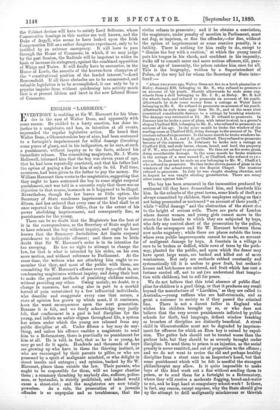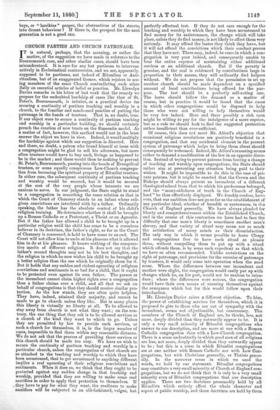ENGLISH " LARRIKINS." E VERYBODY is scolding at Sir W. Harcourt
for his blun- der in the case of Walter Dean, and apparently with some reason. He yielded to a hasty emotion, has done in- justice to a magistrate, and has, in intention at all events, superseded the regular legislative action. He heard that Walter Dean, a Gloucestershire boy of nine, had been sentenced to a fortnight's imprisonment for wilful damage (breaking some panes of glass), and in his indignation, as he says, at such a punishment, without inquiry as to the facts, ordered his immediate release. The committing magistrate, Mr. J. Watts Hallewell, informed him that the boy was eleven years of age, that he had been repeatedly convicted, and that his father had the option of paying a fine for him of only 9s. Gd. Full time, moreover, had been given to the father to pay the money. Sir William Harcourt then wrote to the magistrates, suggesting that they ought to have sentenced the boy to some slight corporal punishment, and was told in a sarcastic reply that there was an objection to that course, inasmuch as it happened to be illegal. Nevertheless, though the law leaves so little option, the Secretary of State condemns imprisonment for boys under fifteen, and has ordered that every case of the kind shall be at once reported to the Home Office, thus to the extent of his .power abolishing imprisonment, and consequently fine, as punishments for the young. There can be no doubt that the Magistrate has the best of it in the correspondence, as the Secretary of State ought not to have released the boy without inquiry, and ought to have known that the Summary Jurisdiction Act limits corporal punishment to indictable offences ; and there can be little doubt that Sir W. Harcourt's order is in its intention far too sweeping. He has no right to attempt to change the law, for that is what is intended by his order, on his own mere motion, and without reference to Parliament. At the same time, the writers who are attacking him ought to re- member that they, and most of the public with them, are committing Sir W. Harcourt's offence every day,—that is, are condemning magistrates without inquiry, and doing their best to make the present methods of punishing children useless, without providing any other. Owing mainly, no doubt, to a change in manners, but owing also in part to a morbid hatred of pain entertained by a few influential individuals, who describe and exaggerate every case that occurs, a state of opinion has grown up which must, if it continues, have the worst consequences upon the next generation. Because it is felt, and we freely acknowledge very justly felt, that confinement in a gaol is bad discipline for the young, and inflicts an unfair stigma throughout life, a system has arisen under which the young are released from any public discipline at all. Under fifteen a boy may do any- thing, and unless his offence enables a magistrate to send him to a Reformatory, there is practically no punishment for him at all. He is told, in fact, that as he is so young, he may go and do it again. Hundreds and thousands of boys are growing up who have in them the thieving instinct, or who are encouraged by their parents to pilfer, or who are possessed by a spirit of malignant mischief, or who delight in street insults and outrages ; and opinion, backed by Sir W. Harcourt, places them outside the law. Their parents, who ought to be responsible for them, will no longer chastise them ; a summary thrashing by anybody else, sufferer, police- man, or bystander, is strictly prohibited, and indeed would cause a street-riot ; and the magistrates are now totally powerless. As a rule, the prosecution of a juvenile offender is so unpopular and so troublesome, that the victim refuses to prosecute ; and if he obtains a conviction, the magistrate, under penalty of mention in Parliament, must not flog, or imprison, or fine the offender,—for fins, without the option of imprisonment or some coercive penalty, is a futility. There is nothing for him really to do, except to " dismiss the boy with a caution," at which the young rascal puts his tongue in his cheek, and confident in his impunity, walks off to commit more and more serious offences, till, pass- ing the age of immunity, the prison catches him once for all. This is the biography, written by a Superintendent of Police, of the very lad for whom the Secretary of State inter- fered :— " About two years ago, Walter Dean set fire to a larch plantation at Bisley, damage £20, belonging to Mr. S., who refused to prosecute on account of hie youth. Shortly afterwards he stole some cog- wheels from a drill belonging to Mr. J. B., at Bisley. Mr. B. had the wheels back, and refused to prosecute on amount of his youth. Afterwards he stole some money from a cottage at Water Lane belonging to Mr. S. He refused to prosecute on account of his youth. Afterwards he stole some eggs from Mr. D., and at the same time committed considerable damage to a cottage by breaking windows. The damage was estimated at £1. Mr. D. refused to prosecute. In January last he broke a pane of glass, with intent to steal, in a grocer's shop at Chalford Hill, belonging to Mr. B., who refused to prosecute on account of his age. In the same month he broke the window of the reading-room at Chalford Hill, doing damage to the amount of ls. The trustees refused to prosecute. In the same month he broke windows be- longing to J. D., S. G., and J. G., at Chalford. They refused to prosecute because of the expenses. In February he broke into a cottage at Chalford Hill, and stole bacon, cheese, bread, and beef, the property of W. W., who refused to prosecute. Ho then set on fire some grass, doing considerable damage. In the same month he broke windows in the cottage of a man named C., at Chalford, who refused to Tr )- secute. In Jnne last he stole an axe belonging to Mr. W., Chaffer 1, who refused to prosecute. He then broke eleven panes of glass in the windows of the school-room at the Baptist Chapel. The trustees refused to prosecute. In July he was caught stealing cherries, and in August he was caught stealing gooseberries. There are many other cases against him."
The boy has been armoured in the immunities produced by sentiment till they have demoralised him, and hundreds like him. In the suburbs of the great towns, some kinds of theft are always committed by children, their employers relying on their not being prosecuted or sentenced " on account of their youth ;" while " wilful damage " and the obstruction of the street riie to the height of serious evils. There are parts of London where decent women and young girls cannot move in the streets for the insults to which they are subjected by boys, who defy any control Short of the prosecution by the police, which the newspapers and Sir W. Harcourt between them now make nugatory ; while there are places outside the town where even public improvements cannot be made, on account of malignant damage by boys. A fountain in a village is sure to be broken or defiled, while rows of trees by the path- way, planted for the public, and upon which the donor may have spent large sums, are barked and killed out of msre wantonness. Not only are orchards robbed constantly and systematically till it is useless to grow fruit, but orchard- houses and hot-houses are entered, and fruit which has cost a fortune carried off, not to eat (we understand that tempta- tion with children), but to sell for pence.
We do not believe that this total absence of public disci pline for children is a good thing, or that it produces any result beyond the manufacture of " Larrikins," as they are called in Australia,—young ruffians who are half-criminals, and as great a nuisance to society as if they passed the criminal line. There is not a decent father in England who wishes his children brought up so, or who does not believe that the very severe punishments inflicted by public schools for theft, bad language, defiant window breaking or breaches of discipline are distinctly beneficial. A street child in Gloucestershire must not be degraded by imprison- ment for offences for which an Eton boy is rained by expul- sion. The gutter lads should not be treated worse than the parlour lads, but they should be as severely brought under discipline. To send them to prison is an injustice, as the social penalty is never remitted, and out of proportion to the offence ; and we do not want to revive the old and perhaps healthy discipline from a stout cane in an Inspector's hand, but that some punishment which will be felt is needful the strongest philanthropist may allow. Is it quite impossible to make boys of this kind work out a fine without sending them to prison, or to send them for a fortnight to a Reformatory, where they will receive a moderate flogging, bread-and-water to eat, and be kept hard at compulsory school-work I Is there, in fact, any reason, except expense, why the State should give up the attempt to drill malignantly mischievous or thievish boys, or " larrikins " proper, the obstructives of the streets, into decent behaviour If there is, the prospect for the next generation is not a good one.



































 Previous page
Previous page